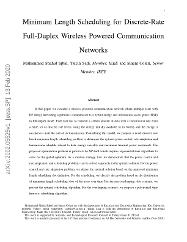| dc.contributor.author | Iqbal, Muhammad Shahid | |
| dc.contributor.author | Sadi, Yalcin | |
| dc.contributor.author | Coleri, Sinem | |
| dc.date.accessioned | 2023-10-19T15:11:56Z | |
| dc.date.available | 2023-10-19T15:11:56Z | |
| dc.date.issued | 2022 | |
| dc.identifier.issn | 1536-1276 | |
| dc.identifier.issn | 1558-2248 | |
| dc.identifier.uri | https://doi.org/10.1109/TWC.2021.3094138 | |
| dc.identifier.uri | https://hdl.handle.net/20.500.12469/5285 | |
| dc.description.abstract | Wireless powered communication networks (WPCNs) will act as a major enabler of massive machine type communications (MTCs), which is a major service domain for 5G and beyond systems. The MTC networks will be deployed by using low-power transceivers with finite discrete configurations. This paper considers minimum length scheduling problem for full-duplex WPCNs, where users transmit information to a hybrid access point at a rate chosen from a finite set of discrete-rate levels. The optimization problem considers energy causality, data and maximum transmit power constraints, and is proven to be NP-hard. As a solution strategy, we define the minimum length scheduling (MLS) slot, which is slot of minimum transmission completion time while starting transmission at anytime after the decision time. We solve the problem optimally for a given transmission order based on the optimality analysis of MLS slot. For the general problem, we categorize the problem based on whether the MLS slots of users overlap over time. We propose optimal algorithm for non-overlapping scenario by allocating the MLS slots, and a polynomial-time heuristic algorithm for overlapping scenario by allocating the transmission slot to the user with earliest MLS slot. Through simulations, we demonstrate significant gains of scheduling and discrete rate allocation. | en_US |
| dc.description.sponsorship | Scientific and Technological Research Council of Turkey [117E241] | en_US |
| dc.description.sponsorship | This work was supported by the Scientific and Technological Research Council of Turkey under Grant 117E241. This article was presented in part at the 18th International Conference on Ad Hoc Networks and Wireless (AdHoc-Now 2019) [1]. The associate editor coordinating the review of this article and approving it for publication was H. Pishro-Nik. | en_US |
| dc.language.iso | eng | en_US |
| dc.publisher | IEEE-Inst Electrical Electronics Engineers Inc | en_US |
| dc.relation.ispartof | Ieee Transactions on Wireless Communications | en_US |
| dc.rights | info:eu-repo/semantics/openAccess | en_US |
| dc.subject | Resource-Allocation | En_Us |
| dc.subject | Energy-Transfer | En_Us |
| dc.subject | Information | En_Us |
| dc.subject | Throughput | En_Us |
| dc.subject | Swipt | En_Us |
| dc.subject | Relay | En_Us |
| dc.subject | Optimization | En_Us |
| dc.subject | Systems | En_Us |
| dc.subject | Design | En_Us |
| dc.subject | Throughput | en_US |
| dc.subject | Wireless communication | en_US |
| dc.subject | Optimal scheduling | en_US |
| dc.subject | Energy harvesting | en_US |
| dc.subject | Scheduling | en_US |
| dc.subject | Batteries | en_US |
| dc.subject | Uplink | en_US |
| dc.subject | Energy harvesting | en_US |
| dc.subject | power control | en_US |
| dc.subject | wireless powered communication networks | en_US |
| dc.subject | full duplex networks | en_US |
| dc.subject | rate adaptation | en_US |
| dc.subject | scheduling | en_US |
| dc.title | Minimum Length Scheduling for Discrete-Rate Full-Duplex Wireless Powered Communication Networks | en_US |
| dc.type | article | en_US |
| dc.identifier.startpage | 135 | en_US |
| dc.identifier.endpage | 148 | en_US |
| dc.authorid | Coleri, Sinem/0000-0002-7502-3122 | |
| dc.identifier.issue | 1 | en_US |
| dc.identifier.volume | 21 | en_US |
| dc.department | N/A | en_US |
| dc.identifier.wos | WOS:000740005900013 | en_US |
| dc.identifier.doi | 10.1109/TWC.2021.3094138 | en_US |
| dc.identifier.scopus | 2-s2.0-85116109768 | en_US |
| dc.institutionauthor | N/A | |
| dc.relation.publicationcategory | Makale - Uluslararası Hakemli Dergi - Kurum Öğretim Elemanı | en_US |
| dc.authorwosid | Coleri, Sinem/O-9829-2014 | |
| dc.khas | 20231019-WoS | en_US |
















